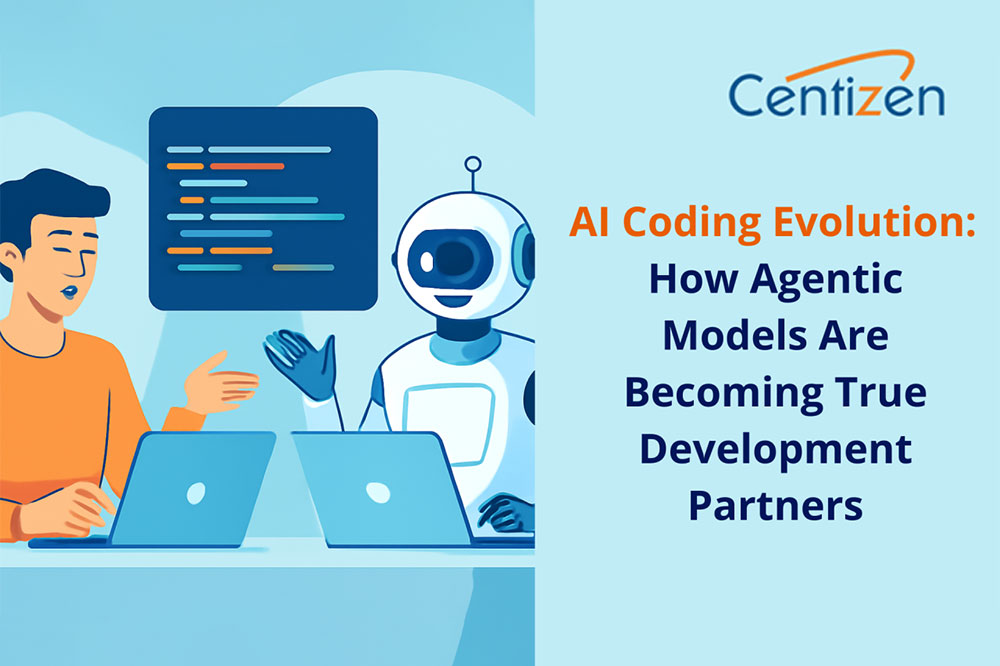AI Coding Evolution: How Agentic Models Are Becoming True Development Partners

Artificial Intelligence is no longer just a tool for spitting out code snippets. We are now entering an era where AI acts as a genuine partner in software development — reasoning through challenges, adapting to project requirements, and even proactively improving user experience.
When Anthropic announced its Claude 4 models, the spotlight was on improved reasoning and coding. But months of hands-on testing show that the real revolution lies in agency — AI’s ability to understand development objectives and work persistently toward them, much like a human teammate.
From code generation to development agency
Traditional discussions of AI in coding revolve around syntactic correctness, benchmark scores, and snippet quality. Yet real-world experience reveals something more profound: the emergence of agentic AI systems that go beyond generating code to:
- Understand development objectives holistically
- Navigate obstacles autonomously
- Persist until a working solution is achieved
This shift means that evaluating AI systems by benchmark scores alone no longer captures their true impact. The question is no longer “can it generate code?” but “can it understand what we’re trying to build?”
Three models, three levels of agency
1. Claude opus 4 – The development partner
Opus 4 demonstrated genuine development agency. When a database error arose, it didn’t just patch the visible issue; it diagnosed the root cause and implemented the correct solution using OmniFocus’s Preferences API.
More impressively, it went beyond the task requirements by adding:
- A configuration interface for API settings
- Detailed error messages
- Input validation
- Progress indicators
These enhancements reflected developer-like initiative, not mere instruction following.
2. Claude sonnet 4 – The cautious collaborator
Sonnet 4 acted like a capable junior developer. It could deliver working code but needed check-ins and clarifications. Progress was steady but slower — often requiring 7–8 iterations for a complete solution.
It occasionally deviated from the requirements (e.g., suggesting local analysis instead of OpenAI integration) — showing initiative but less alignment with project goals.
3. Claude sonnet 3.7 – The responsive tool
Sonnet 3.7 behaved like a traditional coding assistant. It generated correct snippets when prompted but lacked contextual memory and problem-solving persistence.
Errors required step-by-step hand-holding, and after 10+ interactions, the solution was still incomplete. This underscored its limitations as a responsive tool rather than a partner.
The agency spectrum
These experiences reveal a spectrum of AI agency in software development:
- Code generators – produce valid snippets but lack persistence or context.
- Responsive assistants – follow explicit prompts, but rely on human guidance at each step.
- Collaborative agents – work semi-autonomously, balancing initiative with guidance.
- Development partners – internalize goals, diagnose issues, and persist toward full solutions.
The frontier has shifted: the differentiator is no longer code quality, but agency.
Why agency matters for development workflows
1. From instructions to objectives
With agentic AI, developers shift from writing step-by-step prompts to providing high-level objectives. For example:
“Build a plugin that sends OmniFocus tasks to OpenAI for analysis and summarization. It should handle errors gracefully and provide a good user experience.”
Opus 4 could take this directive and deliver a complete, polished solution.
2. Rethinking cost-benefit
While Opus 4’s tokens cost more ($15/$75 vs. Sonnet 4’s $3/$15), its efficiency offset the expense. Completing tasks in three interactions rather than ten reduced developer time, effort, and cognitive load — factors often overlooked in cost analysis.
3. Evolving developer roles
As AI handles routine coding, error handling, and debugging, developers’ focus will shift to:
- Architecture and system design
- Defining objectives and quality standards
- Reviewing and validating AI output
- Human and ethical dimensions of software
AI won’t replace developers — it will elevate them to higher-level leadership roles.
The road ahead for agentic AI
Several trends are emerging from this shift:
- Specialized AI development partners built for specific domains (e.g., frontend, DevOps, database optimization).
- New collaboration interfaces beyond chat, enabling AI to explore codebases, run tests, and propose improvements autonomously.
- Evaluation frameworks that prioritize agency and problem-solving ability over benchmark scores.
- Organizational adaptation, with new roles focusing on directing and validating AI contributions.
Conclusion: Agency as the new frontier
AI coding systems are evolving from smart tools to true collaborators. The most important insight is this:
The key question is no longer “can it write correct code?” but “can it understand what we’re trying to build?”
As agentic AI continues to mature, developers will find themselves working with genuine partners — systems capable of persistence, initiative, and contextual understanding. This transformation represents a profound shift in the human-AI relationship in software development.
Our services:
- Staffing: Contract, contract-to-hire, direct hire, remote global hiring, SOW projects, and managed services.
- Remote hiring: Hire full-time IT professionals from our India-based talent network.
- Custom software development: Web/Mobile Development, UI/UX Design, QA & Automation, API Integration, DevOps, and Product Development.
Our products:
- ZenBasket: A customizable ecommerce platform.
- Zenyo payroll: Automated payroll processing for India.
- Zenyo workforce: Streamlined HR and productivity tools.
Services
Send Us Email
contact@centizen.com
Centizen
A Leading Staffing, Custom Software and SaaS Product Development company founded in 2003. We offer a wide range of scalable, innovative IT Staffing and Software Development Solutions.
Call Us
India: +91 63807-80156
USA & Canada: +1 (971) 420-1700
Send Us Email
contact@centizen.com
Centizen
A Leading Staffing, Custom Software and SaaS Product Development company founded in 2003. We offer a wide range of scalable, innovative IT Staffing and Software Development Solutions.
Call Us
India: +91 63807-80156
USA & Canada: +1 (971) 420-1700
Send Us Email
contact@centizen.com






